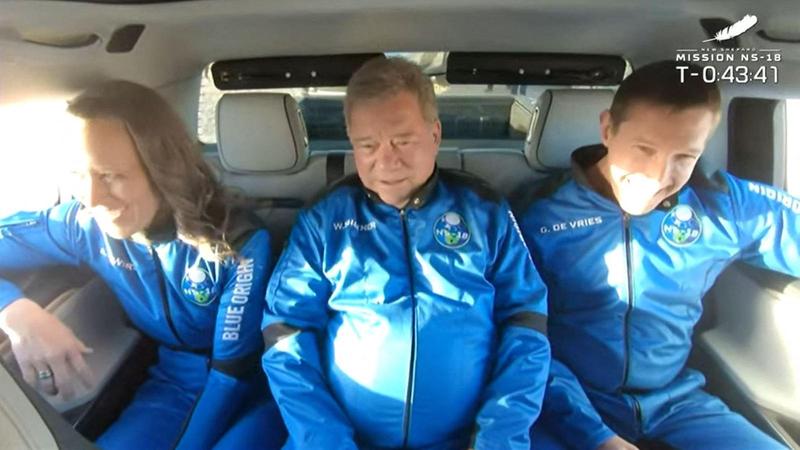Space: captain Kirk of Star Trek landed after his trip to the stars
Published
On Wednesday, Canadian actor William Shatner flew into space, at the age of 90, for a few minutes, aboard a Blue origin rocket.
Blue origin's capsule with four passengers on board, including William Shatner, who played Captain Kirk in the cult Star Trek series, landed on Wednesday in western Texas after a few minutes in space. At the age of 90, the Canadian actor became the oldest person to reach the final frontier.
William Shatner said he had the "most intense experience" of his life. "what you have given me is the most intense experience I can imagine. I'm so moved by what just happened. It's extraordinary, "he said, leaving Blue origin's capsule, to Jeff Bezos, founder of the company, who welcomed him.
This is the second flight with passengers on board for the rocket of billionaire Jeff Bezos' company. He himself made the trip last July. "I will be amazed by the view of space. I want to look at the globe and appreciate its beauty and robustness, "said Tuesday, William Shatner, in a video released by Blue origin. The take-off was initially scheduled at 0900 local time (1600 Swiss time), but was postponed by about 30 minutes, after a recess of the countdown for final checks.
The passengers "arrived at the launch site" and "put on their suits," tweeted the company on Wednesday morning. The video broadcast then showed them in a car, en route to the rocket to board. The New Shepard rocket, fully automated and reusable, takes off vertically. It consists of a launcher and a state-of-the-art design capsule, which can be detached in flight. Thus propelled, it transcends the so-called Karman line, which marks, at an altitude of 100 km, the boundary of space according to the international convention. Passengers can detach from their seats and float for a few moments in weightlessness. The capsule then falls back to Earth, slowed down by three parachutes and a backthruster. For its part, the launcher returns to land automatically not far from its take-off location. In total, the experiment lasts only 11 minutes.

In addition to the Canadian actor, three other passengers will be on board. Chris Boshuizen is a former NASA engineer and co-founder of Planet Labs, an American company that photographs the Earth in high resolution every day using satellites. Glen de Vries is the co-founder of Medidata solutions, a company specializing in clinical trial tracking software for the pharmaceutical industry. Both paid for the trip (the amount was not disclosed). Finally, Audrey Powers, a Blue origin manager in charge of flight operations and the maintenance of the rocket, completes the crew.
Religious series
Less than three months after Jeff Bezos flew into space, this new takeoff clearly shows his company's determination to establish itself in the coveted sector of space tourism. The competition is raging with Virgin Galactic, who offers a similar experience of a few minutes. In July, British billionaire Richard Branson also flew into space on board a spaceship of the company he founded, and in September SpaceX sent four space tourists for three days into orbit around the Earth, a mission that is far more ambitious (and costly).
"we are only at the beginning, but what a miraculous beginning, and how extraordinary it is to be a part of it," said William Shatner in the Blue origin video.
Star Trek, broadcast from 1966 for only three seasons, recounted the adventures of the USS Enterprise, launched on an interstellar exploration mission. The series became a cult for science fiction fans, including Jeff Bezos. The founder of Amazon even appeared in one of the many films derived from the series-unrecognizable under alien makeup.
"Captain Kirk, played by Shatner, may be more the ultimate frontier than anyone for generations," American screenwriter Marc Cushman told AFP. The actor and his fictional character "were symbols of the growing interest of the nation-and of the world-in space exploration," he continued. For a long time led by state agencies, this space conquest is now increasingly taken over by private companies.
(AFP)







